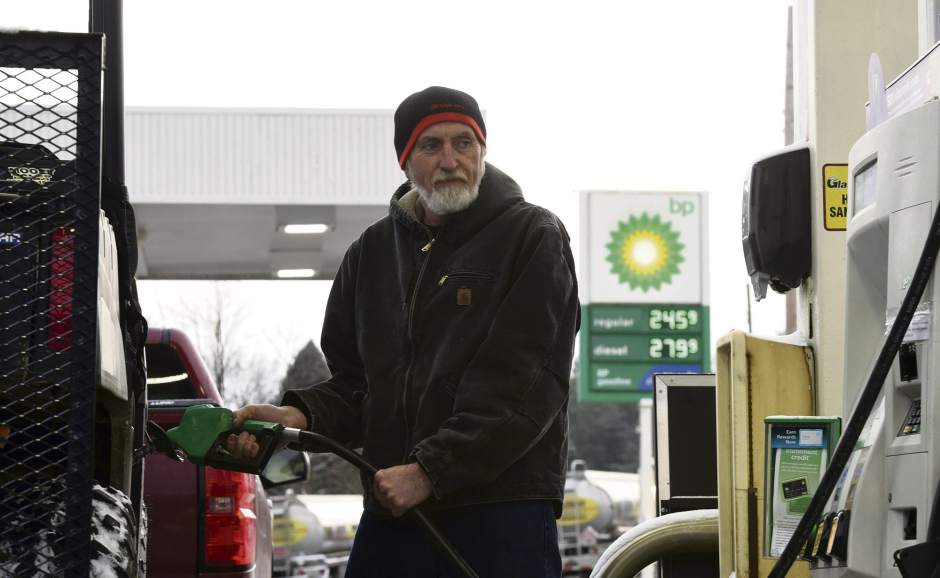Wallet warning: State gas tax set to rise Jan. 1
“Don't tell me the price of gas is going up again,” Chuck Wright said Thursday morning at the Glassmere gas station in West Deer.
Wright, 52, a truck driver from East Deer, probably won't be the only motorist surprised to learn about the change in gasoline prices on New Year's Day.
For Pennsylvania drivers, this new year will feature an immediate and noticeable change in the price of fuel. Beginning on Jan. 1 the state tax on gasoline wholesale prices will jump by eight cents per gallon.
Even before the scheduled rise in taxes goes into effect, Pennsylvania already has the highest per gallon tax on gasoline of any state in the country at 50 cents per gallon.
The price jump, which comes about as a result of a 2013 change in a state law called Act 89 that also increased the tax in 2015, is based off of the state's defined “average wholesale price” for gasoline and diesel.
The so-called average wholesale price is anything but, however.
Instead of being an average of wholesale prices, at least for the year 2017, this figure will be set at a minimum of $2.99 per gallon regardless of actual liquid fuel wholesale prices.
This wholesale price then will be entered into a formula with other state-defined per gallon tax rates to reach a pre-federal tax rate of about 58 cents per gallon. Including federal taxes, set at just over 18 cents per gallon, motorists in Pennsylvania will be paying around 76 cents in taxes per gallon at the pump.
Act 89 didn't just set the price for wholesale gasoline back in 2013, it also eliminated the tax that used to be collected by gas stations at the time of purchase and replaced it with a tax paid on wholesale purchases of gasoline called the “oil company franchise tax.”
That means the tax is generally forwarded to the consumer, but sometimes a retailer may “eat” some of the tax cost in order to supply cheaper gasoline to their customers.
Money from gas taxes in Pennsylvania is used for bridge and road construction, infrastructure projects and funding the state police, according to Richard Kirkpatrick, PennDOT communications director.
“With the added resources from the Act 89 revenue increases in 2013, PennDOT is making significant progress against a huge backlog of highway and bridge improvement needs,” he said. “We have cut the number of structurally deficient bridges from a high of 6,034 in 2008 to 3,662. We have ramped up the construction program by roughly $1 billion a year.”
Kirkpatrick also said that comparisons to other states really aren't a good way to judge taxes in Pennsylvania.
“Comparisons with fuel tax rates in other states are misleading because states use a variety of sources to pay for highway and bridges,” he said. “In Pennsylvania, we have a user fee system. Drivers pay some fees and fuel taxes that go into a dedicated fund that supports highways and bridges and also state police enforcement on that system.”
At least one Pennsylvania legislator attempted to prevent the tax going up with the new year. Rep. Joseph Petrarca, D-Washington Township, submitted legislation in July aimed at preventing the wholesale price from rising.
“I did not support Act 89,” he said. “That legislation called for the tax to be raised in stages. What I wanted to do was stop the last increase in the gas tax from kicking in.”
Petrarca acknowledged the need for new roads and bridges but, according to him, drivers in Pennsylvania already are paying too much.
“My thought was that we certainly have needs in this state as far as roads and bridges,” he said. “But we already have the highest gas tax in the nation, and it did not make sense to raise it again in 2017.”
Petrarca's legislation was sent to committee but died when the legislative session ended this year.
Dell Cromie, owner of Glassmere Fuel, said it is important that people are aware the change is coming.
“If people don't find out about it until just before the new year, gas stations will be slammed,” he said. “If they're concerned about trying to save a dime a gallon, they should do it sooner rather than later.”
Cromie, who pays the tax as a wholesaler, said he thinks taxing gasoline is a good way to fund road construction, but he said he's not sure we're getting our money's worth in Pennsylvania.
“We did a 10-cent increase two years ago, but I don't see that we got 10 cents of work done,” he said.
According to Gasbuddy.com, a website dedicated to tracking low fuel prices for motorists, Hawaii and California have the most expensive gas, despite both states taxing fuels less than Pennsylvania.
Oklahoma has the lowest fuel prices.
For an average passenger car operated by an average commuter the increase in taxes for gasoline will cost about $25 a year, according to Gasbuddy.
Matthew Medsger is a contributing writer.

